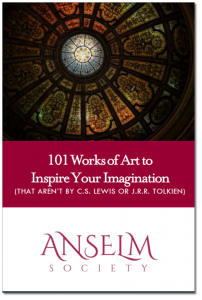EPISODE SUMMARY:
What does it mean to live all of life under the banner of Christ? How should we think of work and play in a sacramental universe? What does work and play have to do with our discipleship unto Christ? And what do they teach us about what it means to be created in the image of God? In season 4 episode 9 of the Eudo Podcast, we’ll continue our tour through the sacramental universe as we consider two part of our lives that fill much of our time, but we so often fail to integrate into a unified life under Christ.
EPISODE NOTES:
Why do we need to talk about Work?
For starters, most of us will spend the majority of our adult lives working. We get up each day and go to work. For many of us, we started working as teenagers, and while the jobs might have change, the fact that we are workers has not. But how, we might ask, does our status as workers figure into our discipleship under Christ? And how does our view of work affect how we see the world around us and our place in it?
According Dorothy Sayers:
In nothing has the Church so lost Her hold on reality as Her failure to understand and respect the secular vocation. She has allowed work and religion to become separate departments, and is astonished to find that, as a result, the secular work of the world is turned to purely selfish and destructive ends, and that the greater part of the world’s intelligent workers have become irreligious or at least uninterested in religion… But is it astonishing? How can anyone remain interested in a religion which seems to have no concern with nine-tenths of his life? [1]
A couple observations about Sayer’s quote: first, notice that she thinks there is a deep connection between religion and work. Second, the Church has failed to notice this connection by and large, and thus, we’ve ceded ground to the secular society, defining work in purely secular terms. So, for most today, work is now understood, as Sayer puts it, as “something one does to make money” [2] In other words, there is no intrinsic value to work, rather we work for the benefit it brings.
On the older view, we work because we are “makers” of things and meaning; we don’t think about work in terms of earning money, but in terms of things done.
What is a Christian understanding of work?
Sayers argues that we can only define work religiously, because in asking the question, why work, we are asking a question about value. But work’s economic value can only be determined by first identifying the absolute value of work. And absolute values are determined in the realm of religion. So, what is a Christian definition of work? According to Sayer, “work is the natural exercise and function of man—the creature who is made in the image of his Creator” [3]. Let’s just pause here and notice that, on the Christian view, work is rooted in the fact that man is created in the image of God.
Sayer discusses Three Implications of this Christian definition of work.
First, “work is not, primarily, a thing one does to live, but the thing one lives to do” [4] We work, as part of our service unto Christ, for the love of God and man. The idea that work is the thing we live to do has four consequences, according to Sayer.
- First, it reconfigures our relationship to salary.
- Second, on the vocational approach to work, we seek work that fits our nature, not just what job can pay me the most money.
- Third, this vocational vision of work reconfigures our relationship with leisure. In other words, since we work unto the Lord, and not just for profit, we should take pride in our work and see excellence in all that we do.
Secondly, according to Sayer, “It is the business of the Church to recognize that the secular vocation, as such, is sacred” [5]. In other words, there is no class of super-Christians—that is, pastors, missionaries, and the like—and the rest of us. All work (setting aside those that our obviously immoral—drug dealer, mob bosses, prostitutes, etc.) can be work that is in service to the Lord. All of our time is God’s time; all of our time—work or play—is in service to God.
Third, according to Sayer, “the worker’s first duty is to serve the work” [6]. The idea is that we love our neighbor best by Loving God first, and we love God first by serving God in our work and we serve God in our work by serving the work. We respect the work, our reward is found in the satisfaction of beholding the perfection of our craft. That is how we serve others. That is how we love God, but respecting the work as work.
Leisure and Play
We don’t want to just work. For many in culture today, we think of our lives in terms of “total work”—work never stops and there is little time for leisure, unless we count binge watching Netflix at the end of the day. But, as Joseph Pieper provocatively said in his 1952 book “one of the foundations of Western culture is leisure” [7]
For Pieper, following the Greeks, leisure was understood as an attitude of mind and a condition of the soul that fosters a capacity to perceive the reality of the world. In other words, leisure includes what we would call contemplation, rest, silence, as well as play. With that wider understanding of leisure in mind, I’ll focus our discussion on one aspect of leisure—play, and more specifically sports, to see how even there, perhaps surprisingly, we can learn to see and delight in God’s good world.
Sports
First, what are sports? According to Lincoln Harvey, sports are “liturgies of nonnecessity” [8] Liturgy literally means “work of the people.” Sports, according to Harvey, are “ordered work” in that they proceed under the guidance of rules [9]. The “nonnecessary” part has to do with the fact that we don’t need sports to live. We might be miserable without them, as many of us our now with the quarantine, but they are not essential to life. Rather, sports function to “transport” us out of our primary world and away from the necessities of life.
Second, how do sports point to more ultimate things?
In his book, Everyday Glory, the theologian Gerald McDermott suggests eight ways that sports point to the sacred order [10].
- First, sports are free creations. We love to make up games and to make up new rules for games. We do this all the times with our kids when we play in the backyard in in the pool. And this freedom to create points to God’s freedom in creating.
- Second, sports are unnecessary. Just as sports don’t have to be, so too, we don’t have to be.
- Third, God plays too. Theologians have noted the playful aspect of God’s joy. Some theologians have argued that wisdom, understood as the Eternal Son literally was “playing” before the Father in creating the world. And we’ve already explored the amazing diversity of life—what kind of God would create an armadillo or a platypus? Arguably, a God that plays!
- Fourth, sports are unproductive. For most of us, at least, we don’t profit from sports. We don’t get anything tangible from sports, and they eat up a lot of our time, money (especially when they lead to injuries). There are obvious benefits—physical health, emotional release, and it’s fun, as we’ve mentioned. So, why do it? The answer: worship produces joy, to the extent that in worship we enter into the fullness of God.
- Fifth, sports are discomforting. Sports are not all comfort: there is the thrill of victory, to be sure, but also the agony of defeat. For every winner, there is a loser, for every victory, there is loss. Something similar, according to McDermott, can be said about religion. It doesn’t immediately bring comfort—in fact one of the first things we share when we share the gospel is that all of us fall short, all of us are sinners and separated from God. This is not comforting. But in the end, relationship with God does bring real comfort, real joy, real wholeness.
- Sixth, sports have their own time. The work-day world has its own time—9 to 5 we might say. But sports keep their own time. An inning in baseball can list a couple minutes or more; a quarter in football can drag on depending on timeouts, penalties, and so on. A game or set in tennis can be rather quick or hours long. Similarly, like sports, the church has its own time, its own rhythm. We can even speak of a theology of time.
- Seventh, in sports there are winners and losers. While we do want our team to win, and while we do often pray, when competing that God would give us victory, in the end it doesn’t ultimately matter. But, as McDermott points out, the idea of winning is a biblical idea! Jesus achieved victory over Satan, we are told, in the atonement (Heb 2:14-15) and we even sing about how we have victory over our sin because of Jesus.
- Eighth, sports are occasions for gratitude. It has been said that sports are “simple a grace—a minor grace—that relieves the weight of life” [11]. As such, sports, like many good things can serve as a means of escape, consolation, and recover
CONCLUDING REMARKS:
So, in this way sports, and play in general, remind us of deep truths about God, ourselves, and the world he has made. They provide for us a moment of escape, joy, and delight—and they remind us that we were made to take up our place in God’s good world. So, all of our time can be sacred, all the places we inhabit can be sacred places as we learn to see and delight in God in our work and in our play.
RESOURCES MENTIONED:
- McDermott, Gerald R. Everyday Glory: The Revelation of God in All of Reality. Grand Rapids, MI: Baker, 2018.
- Pieper, Joseph. Leisure: The Basis of Culture. Indianapolis, IN: Liberty Fund, 1998.
- Sayers, Dorothy L. Creed or Chaos? Manchester, NH: Sophia Institute Press, 1974.
For a the free e-book from our season 4 sponsor, click this link: “101 Works of Art to Inspire Your Imagination (That Aren’t by C. S. Lewis or J. R. R. Tolkien)”


[1] Dorothy L. Sayers, Creed or Chaos? (Manchester, NH: Sophia Institute Press, 1974), 76–77.
[2] Ibid., 70.
[3] Ibid., 72.
[4] Ibid., 73.
[5] Ibid., 76.
[6] Ibid., 80.
[7] Joseph Pieper, Leisure: The Basis of Culture (Indianapolis, IN: Liberty Fund, 1998), 1.
[8] Lincoln Harvey, A Brief Theology of Sport (Eugene, OR: Cascade, 2014); quoted by Gerald R. McDermott, Everyday Glory: The Revelation of God in All of Reality (Grand Rapids, MI: Baker, 2018), 154.
[9] Ibid.
[10] In what follows, I’ve summarized from McDermott, Everyday Glory, 156–160.
[11] Ibid., 160.





